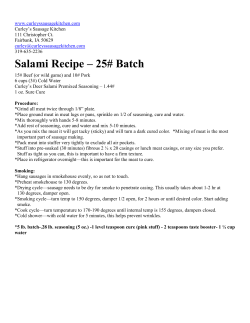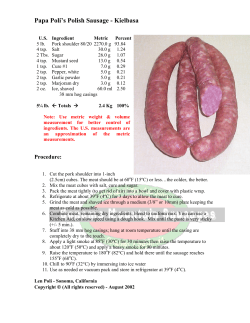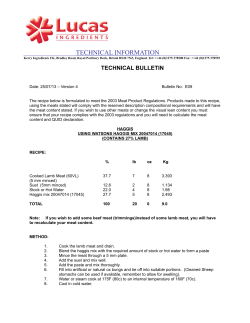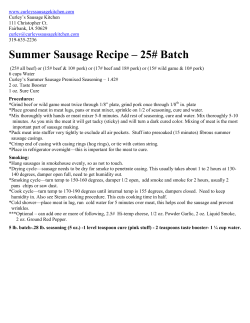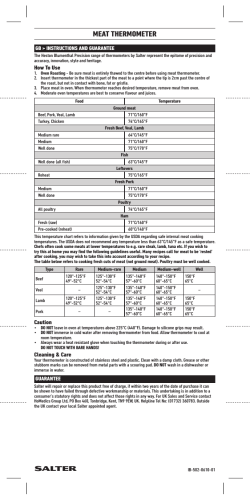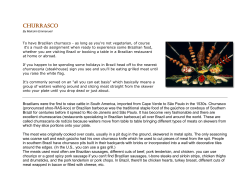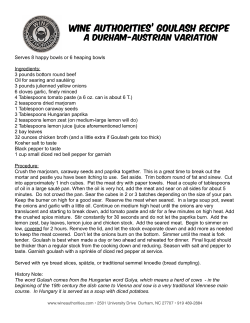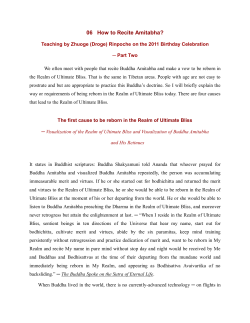
The Udamwara lotus flower protecting the life of helpless beings
The Udamwara lotus flower protecting the life of helpless beings Statements from sutra relating to meat eating In honour of Guru Shakyamuni With faith in the teacher, the conqueror, who truly appeared, directly perceived the ultimate mode of existence, through meditation, exhausted the two obscurations and turned the wheel of Dharma truthfully: who am I to fathom or describe your qualities of wisdom, love and power. Yet if I were to express them in only four lines it would be these: Possessor of skilful means who led even those full of hate like Angulimala, those overcome by desire – the likes of Nanda, and ignorant beings like Lamchung to arhatship Praise also to His Holiness, Tenzin Gyatso, who in our times, just like a second Buddha, performs enormous deeds of love and peace to further your teachings and foster the roots of virtue of all the world's beings - a life-protecting lord. I have written down here, with reference to my sources, what the Buddha said about eating meat. It will surely raise the interest of those who have trust in valid teachings and their teacher. In the following text I intend to give some explanations of how eating meat is presented in the lesser and greater vehicles including tantra. The great Indian scholar Shantideva wrote: "Even though they intend to give up suffering they run into the arms of the causes of suffering. Although they wish for happiness, out of ignorance, they ruin their own happiness like a foe." In full accordance with what is being expressed here, we clearly realize in our daily lives that all sentient beings from humans down to ants wish for happiness and try to avoid suffering. As this attitude is a quality of mind, it would seem evident that there are minds at work here. The continuum of all sentient beings is in fact endowed with a mind characterised by certain qualities. This mind constitutes the true basis for transformation into the omniscient truth dharmakaya and the cessation of the two types of obscuration, including their imprints left on the consciousness. However, as we ourselves and other sentient beings are under the influence of obscurations due to confusion and ignorance, we do not know how to create the correct causes for the happiness we all desire. Likewise, we do not know how to get rid of the causes of the suffering we wish to avoid. We can even recognize the truth of this at the manifest level of our experience. Therefore, the need to look for correct methods that will bring about happiness, as well as correct methods for giving up suffering, is very important . 1 However, this is not the place to discuss the possibility of finding and applying such faultless methods by examining the words of the Buddha through listening, thinking, and meditating and developing the corresponding three types of wisdom. The words the Buddha addressed to the three types of disciples1 due to his limitless capacity of love and compassion and which were laid down in 84000 heaps of teachings are vast and profound. They are the words of an authentic person who realized the ultimate nature of phenomena as they are, meditated on the path according to that ultimate nature and managed to completely give up the two kinds of obscurations. All I can hope to achieve here is a clarification of one important aspect of those teachings: Shakyamuni Buddha rejected the consumption of meat both in the words of the lesser and the great vehicles - both in sutra and tantra. In each case he presented different reasons and types of rejection laying particular emphasis on the object of rejection i.e. meat. However, the rejection of meat procured by means of killing innocent creatures with the specific intention of eating them is stated equally clearly in the Hinayana and Mahayana sutras as well as in the scriptures of tantra. I will present the reasons and sources systematically. In the seventh chapter of the Angulimala Sutra, a Mahayana sutra as rare as the Udamwara flower2, Manjushri asks: "'Is it true that the Buddhas do not eat meat due to Buddha nature?' The Buddha said: 'It is exactly like that, Manjushri. In the sequence of lives during our beginningless and endless coming and going in samsara there is no being that has not been our mother, that has not been our sister. Even dogs have been our fathers before. The world of those lives is like a play. Therefore, since our own flesh and that of others is the same flesh, the Buddhas do not eat meat. Furthermore, Manjushri, the sphere of all beings is the Dharmadatu. As this would constitute eating flesh of the same sphere, the Buddhas do not eat meat." I should like to give a brief explanation of this sutra passage. We find three reasons here why Buddhas do not eat meat. The first reason is expressed in terms of the Buddha's affirmative answer to Manjushri's questions as to whether this has to do with the fact that the Buddha nature, characterised by the three natural features3, is present in the mental continuum of all beings. "It is exactly like that." The second reason is this: As there is no single being that has not been our mother or father in this process of beginningless and endless coming and going in samsara, and as we ourselves and others are of the same flesh, the Buddhas do not eat meat. And the third reason: the sphere of all beings is the Dharmadatu and eating flesh of the same sphere is inappropriate. In this sutra eating meat is thus being rejected through reasoning. However, eating meat is also rejected with reference to its disadvantages. Again in the Angulimala Sutra Buddha says: "Purna4, beings that have previously been cats, constantly attached to eating meat, and beings that reject Buddha nature will all become rakshas5 resembling cats. In the future, too, beings that have taken the form of cat-like rakshas and find killing others and eating their meat irresistible, will be the same as beings that have turned away from Buddha nature." Here eating meat is rejected with reference to disadvantages resulting from it. As to the rejection of meat based on advantages it says in the Angulimala Sutra: 1 with the dispositions of hearers, solitary realizers and Buddhas a flower only found at the time a Buddha is born 3 Buddha nature (tathagatagarbha) is attained by the power of reality. It stems from the mental continuum which goes on from one life to the next and constitutes the seed of unpolluted wisdom. 4 important monastic disciple of the Buddha, Arhat of the abhidharma tradition 5 a kind of cannibal or blood-thirsty creature 2 2 "Buddha said: 'Angulimala, in countless lives, out of respect for the millions of living beings, I have given up fish, meat, fat, in fact any food associated with killing and have also caused beings to do the same. Due to this my body has become the excellent body of a Buddha, characterised by the special marks. Angulimala, in countless lives I have caused millions of beings, gods and humans, to purify all the million mental afflictions. Due to that my body has become a body free from elaborations.'" In this sutra, eating meat is thus rejected with reference to the corresponding benefits. Moreover, in the Mahamegha Sutra (Great Cloud Sutra) the rejection of meat and alcohol is presented in the context of qualities characterising the meditative concentration of bodhisattvas on the tenth level: "The Bodhisattva Mahasattva Mahamegha (Essence of the Great Cloud) asked the Buddha: 'Lord, I ask for the 400 gates of meditative concentration to be explained in detail by the exalted Tathagata.' The Buddha replied: ' [...] Mahamegha, a bodhisattva mahasattva who has attained the concentration of the deep, calm ocean, demonstrates the signs of obstacles in order for beings to renounce killing animals and eating their meat by appearing as a meat seller in places where pigs are sold. In order to bring beings to spiritual maturity he also appears as a beer drinker among beer sellers and in order to clearly show the disadvantages of drinking beer, he will even become chief among them and serve beer to beings without being attached to that activity.'" This sutra rejects meat and alcohol noting the qualities that a bodhisattva attains in the context of the 400 gates of concentration, achieving the meditation of the deep, calm ocean. In the Hinayana sutras we also find quotations relating to our subject like the following passage from the latter part of "Foundations of Medicine", a text contained in the vinaya section of the Kanjur: "The Buddha was dwelling in a multi-storey building by the monkey pond at Vaisali. In Vaisali there lived a captain called Sengge and whenever the people living nearby brought him meat, he ate it. One day he learnt from the Buddha what is true, and he did not eat meat any more. Nevertheless meat was still brought to him but it was given to the bhikshus, and in fact the bhikshus did eat it. Now the tirthikas6 made remarks about this, made fun and clapped their hands: 'Knowledgeable ones, captain Sengge does not eat the meat that has been prepared for him, so it is given to the bhikshus of the son of the Sakyas. And the bhikshus of the son of the Sakyas eat the meat that was meant for captain Sengge.' When they heard this loose talk the bhikshus asked the Buddha and the Buddha replied: 'I have stated that meat which is not appropriate from the three points of view7 should not be eaten.'" Thus the Hinayana sutra containing the vinaya text "Foundations of Medicine" also rejects meat, i.e. meat that is not appropriate for eating on three counts. Nowadays some intelligent and not so intelligent commentators have made the presentation of purity according to the three aspects8, namely "not having seen, not having heard and not suspecting that a being has been killed for ones own consumption" into a rule which is as well-known as a famous quotations. As far as the presentation in the vinaya sutra "Foundations of Medicine" is concerned, there can be no doubt that it is inappropriate to eat meat that has been killed for oneself. However, the fact that the Buddha, referring to meat meant for someone (i.e. captain Sengge) other than those who 6 followers of certain non-Buddhist philosophies in case one has seen or heard that the creature was killed to be eaten or if one suspects this to be the case 8 the opposite of the above three aspects 7 3 actually eat it (i.e. the "bhikshus of the son of the Sakyas"), states "that meat which is not appropriate from three points of view should not be eaten" shows very clearly that eating meat which has been killed for others is also not pure according to the three aspects or inappropriate for eating on the three counts. To good logicians this is clearly evident at closer examination. The fact that the meat of an animal that has been slaughtered for oneself and the meat of an animal that has been slaughtered for others is equally impure according to the three aspects or equally inappropriate for eating on the three counts is thus made clear by the vinaya sutra "Foundations of Medicine". Relying on this sutra we can therefore see that it is unnecessary and pointless to take the statement from the extensive commentary on the vinaya, "not having seen, not having heard and not suspecting" that a being "has been killed for ones own consumption" and make it suit our own interests in a narrow-minded fashion by drawing clever conclusions from it. Similarly the threefold rejection of meat as impure contained in the 14 major infractions and 25 rules of conduct of the Kalachakra system has to be applied to meat of animals that have been slaughtered for both oneself and others as impure according to those three aspects. The Kalachakra is a Dharma system comprising all the points of sutra and tantra in their entirety and is therefore in agreement with statements from the vinaya. For those in doubt about the possible karmic consequences from eating the meat of animals for health reasons, for instance water buffaloes, sheep or goats that have died according to the Dharma9, and about whether, therefore, such meat should also be abandoned it may be stated that from a Buddhist point of view this position resembles Devadatta’s understanding of what constitutes renouncing meat as presented in his Five Instructions10. Furthermore, in the context of shramana11 Dharma practice exemplified by one of the main disciples of the Buddha, the Sthavira Mahakaskyapa, who did not eat meat and did not accumulate even the tiniest bit of worldly wealth, it says in the Angulimala Sutra: "Angulimala said: 'Indra, you have strayed away from the teachings. In fact it is like this: he who abandoned jewels, pearls, lapis lazuli, gold, kunda stones and the like, 80000 vases filled with jewels, grains of gold and other precious things, cast away priceless clothes as if they were drops of spittle, renunciate of the shramana Dharma, Sthavira Mahakasyapa, main follower of the Tathagata who took up residence in the forest and also upheld the conduct of physical restraint in accordance with the twelve qualities of spiritual practice - why did the great Sthavira (Maha)Kasyapa not wear precious clothing, why did he renounce his households and uphold the conduct of physical restraint purely, giving up foods like nectar and meat dishes? He went from house to house and whenever the householders feigned stupidity and said: 'We have nothing at all to spare, neither in front nor at the back nor on either side' or berated him, he answered, 'May you be happy' and returned with an easy mind. Likewise whenever they said 'we have something for you', the Sthavira answered without attachment 'May you be happy' and returned with an easy mind. Now if through each of (Maha)Kasyapa's own treasure vases future shramanas could have enjoyed food, drink and delicacies till the end of their lives, why did he not bequeath such enormous wealth to the Sangha? Giving up the sense of 'mine' and letting it go, making it the inexhaustible treasure of hungry ghosts, of those in need, of miserable ones and of beggars that is the Dharma of shramanas, Indra. Accumulating wealth if only the size of a sesame seed is not the Dharma of shramanas.'" 9 without harm to oneself or others, which - in this case - implies that the animal has not been killed to be eaten and that its meat has no deleterious effects (on one's health) 10 a view that Buddhists generally do not accept as valid 11 spiritual practitioner, especially one having taken monastic vows 4 Who would deny - with this sutra in mind - that it would be appropriate for us who have renounced household life and taken vows of ordination, to look up to Sthavira Mahakasyapa as an unequalled model to be emulated? Although he owned the full gamut of worldly possessions, he gave everything up, realizing that even the tiniest possession viewed as 'one’s own' is no Dharma of shramanas and renounced food from dead animals thereby upholding the pure conduct of vegetarian discipline in accordance with the twelve qualities of spiritual practice! One day in the times of the Buddha Maitreya may we have the fortune to come face to face with the great Kasyapa. As far as the use of honey12, leather shoes, white conch shells (employed as ritual implements) and silk worms is concerned we also have the telling response to a question by Manjushri. Since what matters within worldly things is a 'reality of methods', wearing leather shoes is appropriate if the buffalo whose skin was used to make them died in accordance with the Dharma13 and inappropriate if the leather has come from an animal that was killed. The use of honey, conch shells and silk is also said to be appropriate if the material was derived from animals that died in accordance with the Dharma i.e. that were not killed especially. In the Angulimala Sutra it says with regard to this point: "Manjushri asked: 'Are not honey and conch shells and shoes and silk worms like the meat of the same sphere?' The Buddha answered: 'Do not speak thus, Manjushri. Having given up all worldly bodies the Buddhas are not dependent on material things and therefore do not need any substances of attachment. The reality of the world is the use of material things. Materials pass from one to the other as they are used - you should not use whatever materials are at hand indiscriminately. That which has been passed on but did not originate from a killing hand is fit for use.' Manjushri asked: 'If a shoemaker in the market has made leather shoes and offers them to the Tathagata, Arhat, perfectly enlightened Buddha, will he accept that which has passed through several hands?' Manjushri went on to ask: 'If a buffalo has died in accordance with the Dharma and the owner has it skinned by a slaughterer, visits a shoemaker to have the leather fashioned into shoes and then gives them to someone following the rules of discipline would that be "something passed from one to the other"?'. Thus he asked and the Buddha said: 'If the buffalo died in accordance with the Dharma, and the owner has shoes made and gives them to someone following the rules of discipline, then they should be accepted. Would it be fitting for a monk not to accept them? This would show a lack of compassion and the rules of discipline would be harmed.'" On this occasion, in the sutra, Manjushri asks the Buddha three questions: one about honey, conch shells, shoes and silk worms, one about a shoemaker offering shoes to the Buddha whose leather has passed through several hands so that the origin is not clear and one about another person offering shoes made from the hide of a buffalo that died naturally. The first and the last questions are being answered, but not the middle one. There is no need for that, as the answer to the last question implies that it is inappropriate to accept the gift referred to in the middle question. Some people put forward the argument that if it is inappropriate to eat meat, it would be equally inappropriate to eat rice. However, this is not the same because to give up eating meat and reduce the number of animals being killed is an act that is well within the bounds of possibility. During the cultivation of rice and vegetables there is no intention to kill beings while planting the seedlings, irrigating the fields etc. However, since there is no way of preventing insects being killed unintentionally - as this is not currently within the bounds of possibility - it is still not the same as killing on purpose. The answer to a question posed by Manjushri may serve to clear up any doubts on the part of those critics who, based on this kind of comparison, conclude that one would consequently have to do the impossible. In the Arya Angulimala Sutra Manjushri asks whether or not 12 although bees are only killed accidentally in the process of getting at their honey, honey is usually included in lists of unwholesome animal products as it is the result of stealing something very precious from animals 13 i.e. not killed for the purpose of using its parts 5 it is appropriate to dig up the soil and sand, till fields and cook one’s food because of unclean water. The answer is as follows: Manjushri says: "'Digging and tilling is not appropriate. Food that has been cooked because the water was contaminated should not be accepted – in this situation, monks have to act accordingly.' Thereupon the Buddha said: 'That is what is called the worldly view. If there are upasakas14, stick to clean water and food. Wherever there are upasakas, there should be no digging and tilling. Where there are no upasakas, what should even Buddhas do there? There are also creatures in the grass, as well as in the water and in the air. If it were like this, would there not be negative karmic effects from altogether pure actions? The question as to how you purify something that cannot be completely pure while living in the world and without giving up the samsaric body is a futile question." The main significance of this sutra passage is that if there is a chance of giving up harming other beings you should always make use of it. On the other hand, actions committed where there is no such possibility are not altogether free from negative karmic consequences, but, due to the absence of harmful intent, those consequences are far weaker. Having taken on this body owing to karma and afflictions, we find it very difficult, at present, to perform any pure actions at all. So it becomes all the more evident that we need to strive for methods to attain the eighth bodhisattva level - to achieve the vajra body which exists uncontaminated by any harmful action. In the Lankavatara Sutra meat is rejected from the point of view of impurity and because it has been our fathers and mothers: "Since it used to be our dear ones since it is mixed with what's base and impure a mess that has evolved from blood as everyone is scared by killing yogis always give up meat […15] and beer inducing inattention" The Lankavatara Sutra also denounces the disadvantages of excess and overstatement of the advantages of eating. It says: "From eating inattention is born, from inattention concepts are born, from concepts desirous attachment is born, desirous attachment dulls the mind, Through dullness attachment to being is born and you will not break free from samsara." In the same sutra, eating meat is also rejected with reference to unpleasant effects on future lives: "Killing beings for profit's sake, trading possessions to purchase meat those with the karma of these two evils wail and lament as they fall after death. 14 15 Buddhist householder without monastic vows The omission regards the avoidance of onions and garlic which relates specifically to the practice of kriya tantra. 6 There may be no sense of causing to kill still the meat is not pure in three ways, as there's no action without a cause16that is why yogis give it up. All the Buddha Bhagavans, denounce it in all ten directions: One devours the other, falling among the predators after death, always born among the lowly, smelly ones and idiots, frequently among the outlaws: hunters, butchers, cannibals and among ghosts in human form, among the various eaters of meat: as in the wombs of cat rakshasas. In the Elephant and the Great Cloud, in the Angulimala Sutra, in the Lankavatara Sutra, I strongly rejected eating meat. Buddhas, bodhisattvas and the shravakas revile it all and those who impudently eat meat will always be reborn as fools. Before I taught you to abandon meat that was seen, heard or suspected...17 Dogmatists failing to understand this are born in places where meat is consumed. The Arya path of liberation is thus veiled through the fault of attachment. Meat, alcohol, onions and garlic cause obstacles on the Arya path. In the future proponents of ignorance, mitigate eating meat and claim: 'As meat is appropriate, free of evil, the Buddhas have permitted it'. Food should be viewed like medicine: accordingly yogis well versed in the Dharma eat the gifts from their alms-round regretful as if it were the meat of their own dear sons. Whoever is steeped in compassion feels that sorrow - thus have I explained. Others will always dwell in the company 16 17 that is the meat does not go on sale without causes, i.e. without an animal being killed. That should be clear to the buyer. to have been obtained by killing animals 7 of wild beast such as tigers and wolves. Whenever meat is eaten, beings are terrified and that is why yogis, out of compassion do not eat it. Eating meat lacks compassion and wisdom, it means turning away from freedom, it violates Aryas' victory banners18, Therefore eating meat is folly. To be reborn in the houses of Brahmins, or in places where yogis dwell, in the homes of families rich in wisdom those are results of abandoning meat." This is written in the Lankavatara Sutra. Apparently, some people have misinterpreted this sutra to the effect that it is only directed to a certain assembly of raksha men and women and does not apply to the rest of us. However, this interpretation is quite untrustworthy. Any sensible person should be able to tell from the answers to Manjushri's questions in the Angulimala Sutra and similar quotations, whether or not such arbitrary statements and distortions of Buddha's valid words should be given credence. Furthermore everyone familiar with logic agrees that you would have to be someone like the great forerunners Nagarjuna and Asanga – foretold by the Buddha himself - to be able to tell definitive statements from interpretable ones by relying on the criteria of special intention, contextual necessity and contradiction with reality. It would take an expert authenticated by the Buddha himself to establish any intentions alleged to be at variance with his literal statements, not some arbitrary sophist expounding all kinds of interpretations. Otherwise the meaning of the prophecies about Nagarjuna and Asanga would be lost. The above prediction from the Lankavatara Sutra already anticipates this: "In the future proponents of ignorance / mitigate eating meat and claim: / As meat is appropriate, free of evil, / the Buddhas have permitted it.' " Although it is unlikely that the sailor’s tale told by a fishermen like myself can bring about any benefit, nevertheless, how could the words of the Tathagata fail to bring about benefit? - with these words of relief I sit back for a moment now that the main body of this text is completed. I would like to add a point His Holiness the Dalai Lama, Tenzin Gyatso, made at the Kalachakra initiation in Mundgod suggesting that in the past, at the time of the Great Dharma kings of Tibet, eating meat was also rejected. He said the old edicts of the Dharma kings were quite clear on this: 'The monks shall learn the behaviour of the pandits and the great abbot (Shantarakshita): drinking alcohol, eating meat and the like are inappropriate.'" His Holiness the Dalai Lama also said: "None of the visitors coming to Bodhgaya from all over the world offer alcohol and meat, it is only the Tibetan pilgrims that spread out their pieces of meat and liquor saying 'we are doing our offering ceremony' - I do not think this is nice, I have often said that. I also do not like the fact that during the big assemblies at the major monasteries platters full of meat are set up with the words 'we have performed an offering ceremony'. I have said again and again that it is better to set up substances like nectar pills, blessed water or black tea. And if some people claim that, according to anuttarayoga tantra, you have to take meat, the only reason that may be quoted in support of this claim is the statement about the acceptance of the five kinds of meat and the 8 five kinds of nectar. There is no other reason. Quite apart from the fact that this refers to a very high level of realization, if indeed you postulate the need for eating meat based on the statement about accepting the five kinds of meat and the five kinds of nectar, then you should be consistent and insist on the need for eating horse meat, dog meat as well as human flesh, drinking urine and eating faeces19." At the time I noted down the Dalai Lama’s words precisely: Once we accept the statement about the five kinds of meat and nectar, the claim that we must eat meat would clearly and logically imply that we must eat dog meat and human flesh, too. The main point of the sutras quoted here is to demonstrate that the Buddhist Dharma is a teaching of non-violence. As this fundamental principle, i.e. not to harm, constitutes the core and root of the Buddhist teachings, it is important to apply and implement it. It is good to rely on statements by the Buddha when it comes to deciding what is wholesome and what is unwholesome. Is the main point of the teaching of non-harmfulness not lost, if you try and substantiate your own desires with tortuous arguments, carelessly eating the meat of killed animals? The Buddha drew a distinction between actions that are "unwholesome by nature" and actions that are "unwholesome because of vows". As far as the latter are concerned he made certain modifications taking differences in time and place into account. For instance he rejected daily baths for monks in some countries, but permitted them in hot countries or he generally prohibited touching women under the influence of attachment, making nevertheless clear that under a number of circumstances it would be correct and necessary to touch them - for instance when a woman is in danger of drowning and has to be pulled out of the water. While allowing for such modifications considering a given situation in the context of actions "unwholesome because of vows", there was no way a licence for actions "unwholesome by nature" such as killing and stealing could be given. Although they may also depend on the time, place and nature of the action, these are harmful actions and even a Buddha cannot change harmful karma into wholesome karma. The aspect of non-violence in the teachings of the Buddha is demonstrated by the unanimous rejection of harmful actions such as killing, stealing and the like in all the sutras and tantras and I rejoice in the fact that all the successors of the Buddha in the traditions of Hinayana and Mahayana, of Sakya, Gelug, Kagyu and Nyingma continue to explain and practice this teaching in accordance with the fundamental idea of non-harmfulness. Thus I have scooped a jug of the nectar of Buddha's words from the great and lesser vehicles, from sutra and tantra, from the Angulimala Sutra and other scriptures on the issue of giving up and accepting meat, without exaggeration nor understatement, and I have embellished it with the fresh white lotus flower of statements by his Holiness the Dalai Lama - may this offering, too, become a cloud of offerings that pleases the Buddhas. One's flesh and that of others are no different But making a difference and eating it we have long roamed. The Buddha taught: everyone's realm is the Dharmadatu one must not eat the meat of one's own realm. Composed in the year 2620 after the Buddha's birth, the year 1995 according to the Western calendar, with the wish to benefit by Geshe Thubten Soepa.Mangalam. The above booklet about eating meat was read through, cover to cover, by His Holiness, the 14th Dalai Lama, Tenzin Gyatso. He told me: "It is well written. It would be nice if more equally useful texts were written for people to read". I cannot express how pleased I was at these words. I would like to complement my composition by a few questions and answers concerning the topic. 18 19 what is meant are the robes of ordination that is what the five kinds also refer to 9 Question: Don't you need some meat for the sacrificial Tsog ceremony? What do you do about that? Answer: In Dza Patrul Rinpoche's lamrim text it says: “To that end it is appropriate to use meat from an animal that has not been slaughtered for eating. However, if you introduce meat that does not conform to this requirement into the mandala of offerings, all the deities and wisdom beings will vanish”, that is what Gampopa said. In the autobiography of the siddha Kunleg you will find the statement: "Now, when you make offerings, you should bear in mind the following points concerning the recipient of the offerings, the offerings themselves and your motivation: Each of the three jewels (Buddha, Dharma and Sangha) is fit as a recipient for the offering. The object to be offered should not be associated with theft, violent appropriation or killing and the motivation should consist in the aspiration to attain enlightenment for the benefit of all beings. Offerings made in a different manner with masses of meat and alcohol are found among the earlier non-Buddhist religions, but not among Buddhists." The Dalai Lama's statements regarding this point have already been presented above. Question: What is the right approach to the so-called meat and blood tormas in protector rituals? Answer: That is evident from Patrul Rimpoche's Lamrim text. It describes the protest of Guru Rimpoche, Shantarakshita and all the pandits contemporary with the Dharma King Trisong Detsen, at the Tibetan practice of sacrificing meat and blood according to the Bonpo custom: 'If you continue this custom we shall go back to India', they said. They stopped partaking of food and refused to give any more teachings. It follows that these so-called meat and blood tormas should not be made up of real meat and blood. If you really make offerings of meat and blood, no deities and wisdom beings will come. You will only attract ghosts. As they feast on such offerings, they may become friendly and bring you short term benefits. If you then fail to continue giving them meat and blood, they will harm you. However, if you go on making offerings of meat and blood, you will be reborn among such ghosts or you will find yourself among wolves and birds of prey. That is what Patrul Rimpoche said about this topic. These so-called meat and blood tormas symbolize the ignorance, harmful intent, selfishness and self interest in one's own mind and that of others. These characteristics are meant to be visualised as tormas and offered in this form - not as external substances made up of real meat. The meaning of the secret mantra is not to be taken literally. It only opens up through an understanding of the six alternatives and four modes of explaining vajra expressions. Question: How about offerings of the five kinds of meat and nectar mentioned in the texts of highest yoga tantra? Answer: A yogi practising highest yoga tantra needs some kind of realization substance for giving up dualistic concepts of pure and impure. As Patrul Rimpoche makes clear in his Lamrim, this also requires meat from an animal that has died a natural death and rather than having been slaughtered. As a matter of fact this is not meant for people who carelessly indulge their craving for meat, but exclusively for yogis who can transform the five kinds of meat such as dog meat and human flesh as well as the five substances like faeces and urine into nectar through the power of concentration. It is not meant for people like you and me. Question: Is it true that offering meat to a monk results in merit being accumulated and that there is a benefit for the dead animal? Answer: Gelug Shamar Pandita, tutor of the 13th Dalai Lama, said in his Lamrim text: “some people of blind faith think it is beneficial to slaughter sheep and goats for the soup of monks or the food of gurus, however, in fact it is a grave harmful act due to confusion and wrong views and it is important to be clear about this.” He goes on to say in his Lamrim: "To Buddhas each and every living being is as valuable as if it were their own child and to all beings, life is the most important thing. You, who dare inflict unbearable pain on such beings out of greed for a mouthful 10 of meat, you think of yourselves as followers of the Buddha and call yourselves lamas and monks! Shame on you! You should judge yourselves harshly." Question: Monks and nuns have to accept meat that benefactors give them, don't they? After all it says that you should eat whatever you are given when going on your alms round. Answer: In Panchen Deleg Nyima's commentary on the vinaya it says: “If a monk is offered meat dishes by a donor on his alms-round, he should ask whether or not the meat has been obtained through killing.” And in the commentary on the vinaya called "Rays of the Sun": "You have to ask whether or not the offering has been obtained through an action against the rules." Numerous vinaya scriptures point out that you should make sure the gift that is being offered does not contradict the rules of monastic discipline. They also mention 20 types of meat and other foods that must not be eaten at all, even though the creature may have died a natural death, for instance human flesh, the meat of monkeys or that of vultures. Therefore, if in doubt about the origin of meat, you should definitely ask and decline anything inappropriate. Even if the gift is appropriate, it is important to ask whether eating or drinking it may have any drawbacks or deleterious effects on one's health, for instance, if you are diabetic whether it contains any sugar etc. Apart from that, offering food containing meat constitutes impure giving: In the "Sutra to Rishi Gyepa" Buddha Shakyamuni taught about how the 32 types of impure giving should be abandoned and how to perform correct giving. Impure giving is divided into four categories: impure with regard to the motivation, the object given, the recipient of the gift and the manner in which it is given. In this sutra, giving meat originating from killed animals, alcohol offered to the careless, as well as weapons, poison and the like are enumerated as cases of impure giving with regard to the object. Question: In Buddhism eating meat is allowed as the Buddha himself ate meat: The cause of his death was eating poisoned pork that an evil-doer had given him. Answer: This story circulates, however, looking at statements contained in the authentic scriptures it does not seem very plausible. As far as I know there is no reliable source for it. On the other hand indications that the Buddha rejected meat can clearly be substantiated with the above passages from the Lankavatara Sutra, the sutra "Vinaya Foundations of Medicine" and the Angulimala Sutra. The reason why the Buddha could not easily be harmed by poison is that he did not manifest himself in an ordinary aspect. He appeared in the aspect of a Buddha, both in essence and in his individual characteristics, which is why poison could not have harmed him. In the Kanjur we find a story where the householder Pelbe, belonging to a different religious group, offered poisoned meat to the Buddha, thinking he was not clairvoyant as he ate it. However, as the poison did not have any effect on the Buddha he deeply regretted his deed and confessed it. Afterwards he became a monk and attained arhatship. There are also accounts in the sutras about how Devadatta set a wild, maddened elephant on the Buddha in order to kill him, but did not manage to do so, about how he shot at him with a sling-shot, but could not do him any harm. If the Buddha had indeed been as easy to kill as a normal being, dying from swallowing poison, I think he would have hardly been able to manifest one of his 12 deeds, such as the taming of Mara. The Hinayana presentation of the Vaibhashika abhidharma also deals with the 18 extraordinary qualities - exclusive features of a Buddha's body, speech and mind - and the 43 additional ones shared with Arhats and Pratyekabuddhas which include the 10 powers as qualities of the mind. In this context, the term "power" implies that it cannot be harmed by anything and that, on the contrary, it will overcome anything. The Buddha could not be harmed by either mental afflictions or the four Maras and the like. As for his ability to overcome adversity, Vasubandhu makes clear in the seventh chapter of his Abhidharmakosha that the Buddha's powers over the physical realm arise from 11 his mental powers and correspond to them. Consequently, poison cannot do any harm to the body of a Buddha. Furthermore, in the Mahayana texts we find presentations regarding the attainment of the vajra body20 from the eighth bodhisattva ground and descriptions of the vajra body itself in the mantra system. The story about harm through poison does not take all these qualities of a Buddha into account. In the Buddhist scriptures of sutra and tantra, eating meat of animals that have been killed especially is rejected. If you have eaten such meat, you should try to purify the harmful effect. Question: Is food that contains meat suitable for offerings or not? Answer: If it is the meat of slaughtered animals it is not. If you offer meat that has been obtained through killing, you will be hard put to give a reason for not calling this a "red sacrifice"21. As we learn from both sutras and commentaries, Buddhas, bodhisattvas and all those whose nature is compassion are filled with sorrow rather than joy at such sacrifices. Therefore, instead of reciting the offering prayer before eating food containing slaughtered meat, it would be better to recite the Akshobya mantra or other mantras such as om mani padme hum and blow on the meat, as this might bring about a little bit of benefit. And try to find methods for redressing the harm caused by eating meat. The best means of purifying it is to save the life of animals. We should strive to employ any available means to benefit beings, we should pray for that intention and do anything else we possibly can. It really is of great benefit to consider, over and over again, how difficult it will be in future lives to redress having taken the meat and life of others, to consider that this is not a law that has been decreed by anyone, but a natural process of cause and effect, and to proceed to a point where, moved by compassion, we give up eating meat, liberate beings and save their lives. The translation and printing of this text has been made possible by Yeshe Lhamo, a Tibetan resident in Bern (Switzerland), who provided the financial means, dedicating the benefit accrued to her recently deceased father, Jo Tondrub. Through this publication, may all beings, who have without exception been our fathers and mothers in the past, be freed from fear about their lives. Moreover may the life of His Holiness, Tenzin Gyatso, be long. May this cause peace to spread on earth, the harmonious practice of all religions to be strengthened, the difficulties between Tibet and China to be resolved peacefully and the Buddhist teachings always to be explained flawlessly. May there always be teachers that point out good paths all over the world. Very slightly edited (some typos etc.) by Rudy Harderwijk. 20 The term "vajra body" is used both in the general Mahayana and in the Mantrayana, but with different meaning: In the Mantrayana it signifies the inseparability of body, speech and mind, a meaning that is not implied by the general Mahayana (sutra system). 21 Blood sacrifice which involves the killing of animals - not accepted in Buddhism 12
© Copyright 2026
